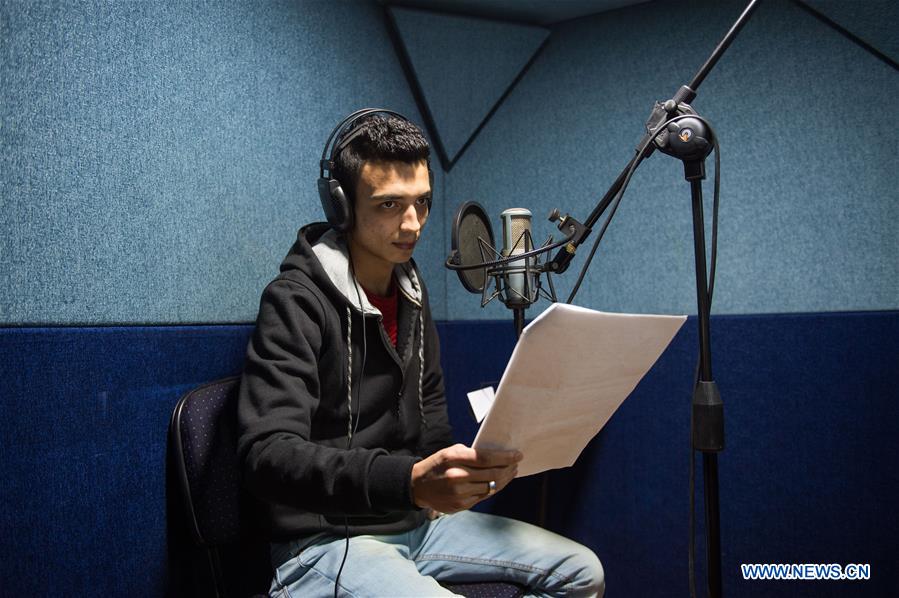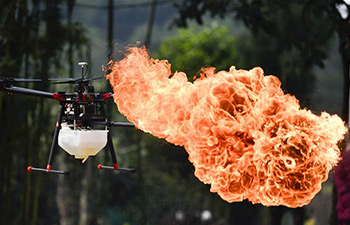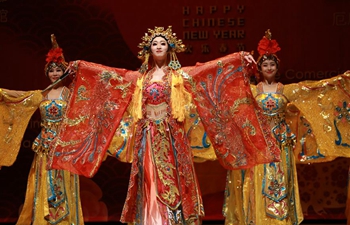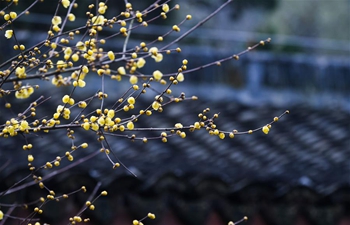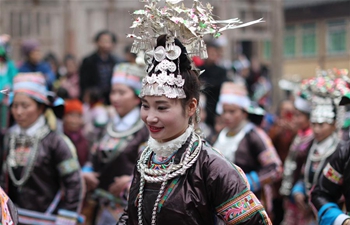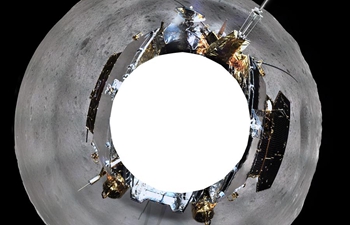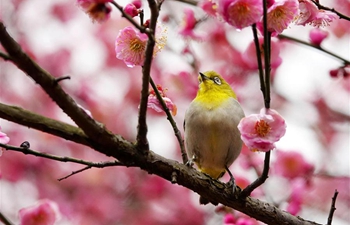A dubbing actor of the Vibration Studios works on Arabic dubbing of a Chinese TV drama inside a studio in Cairo, Egypt, Jan. 9, 2019. "I believe that I started to know more about the Chinese culture, people, history and traditions through working on the Arabic dubbing of Chinese drama," said an Egyptian media production manager, "so, I love what I am doing." Ashraf Hamed is chief of Vibration Studios, a partner with China Radio International (CRI) for producing China-related Arabic radio shows and dubbing Chinese drama in Egypt. (Xinhua/Meng Tao)
by Mahmoud Fouly
CAIRO, Jan. 17 (Xinhua) -- "I believe that I started to know more about the Chinese culture, people, history and traditions through working on the Arabic dubbing of Chinese drama," said an Egyptian media production manager, "so, I love what I am doing."
Ashraf Hamed is chief of Vibration Studios, a partner with China Radio International (CRI) for producing China-related Arabic radio shows and dubbing Chinese drama in Egypt.
"Our work surely promotes the Chinese culture in the Arab world. The broadcast of 'Jin Tailang's Happy Life' had the highest viewership rate on Channel 2 of Egypt's state TV, according to official data and statistics," Hamed told Xinhua at one of his studios.
In the two-storey Vibration Studios, dubbing artists, editors, sound engineers and technicians have been busy working on the Arabic dubbing of a Chinese TV drama as part of an Egyptian-Chinese cooperation.
"We started our cooperation with CRI in mid-2012 through its regional office in Cairo. Over the past six years, we dubbed several Chinese TV series and we expanded our partnership with CRI until we have now daily radio shows broadcasted on the Egyptian radio," Hamed pointed out.
In late 2013, CRI and Egypt's state TV signed a protocol for on airing award-winning Chinese soap opera "Jin Tailang's Happy Life" for the first time in the Egyptian TV history. Later on, other dubbed Chinese dramas have been broadcasted on Egypt's TV through a similar agreement signed in September 2015, including "Romance of Our Parents," "Never Give Up Dodo" and most recently "Ode to Joy."
"Through these years of cooperation with our friends and partners in Vibration Studios, I believe everyone in the studios now knows more about China, especially the modern life of Chinese people," Wang Xin, an executive producer at CRI regional bureau in Cairo, told Xinhua.
"We don't choose to dub only the TV series reflecting China's traditional culture but also those depicting the modernization and development of today's China," Wang continued. "We want the audience in Egypt and even the Middle East to be more familiar with modern Chinese people."
In one of the recording studios, which is soundproofed with sound-absorbing foam, a microphone was standing where dubbing artists record their dialogues as a main part of the dubbing process.
Doaa Riyad, an Egyptian dubbing actress who has been working in the field for years, said that dubbing Chinese drama is one of the most difficult tasks because the Chinese way of uttering words is different from that of Arabs.
"A Chinese sentence might be too long for its Arabic translation or vice versa, which is another problem we face in dubbing Chinese drama, which makes the lip sync during voice over very difficult," the dubbing artist told Xinhua in the recording studio.
"But we overcome all this in the script preparation and do our best to make it look good in the end," she added.
The lady, who played Fan, one of the main characters of "Ode to Joy," said that dubbing Chinese TV series gave her a general idea about the Chinese social life.
"I believe the Chinese are more like us, unlike Westerners, even in the husband-wife relationship and the traditions related to girls, their manners and their marriages, etc," the dubbing actress told Xinhua.
Engineers and technicians in a nearby dim well-equipped studio, with advanced hardware equipment such as mixers, preamps and speakers, are responsible for creating the Foley, arranging the video and audio tracks, and delivering the final dubbed work.
Mohamed Ghanem, a sound engineer and designer at Vibration Studios, explained that his team realized the lip sync issue after their first experience of dubbing Chinese TV series, so they started to prepare for it from the very early stages like the phase of translation from Chinese to Arabic.
"We record the dialogues of actors on a track, while the music has a separate track and the ambient, effects and Foley have a different track and we have a final track gathering them all," Ghanem said.
"I enjoy watching the Chinese drama while working on dubbing them to the point that sometimes I work on an episode and wait for the next to see what happened," the sound engineer told Xinhua.




